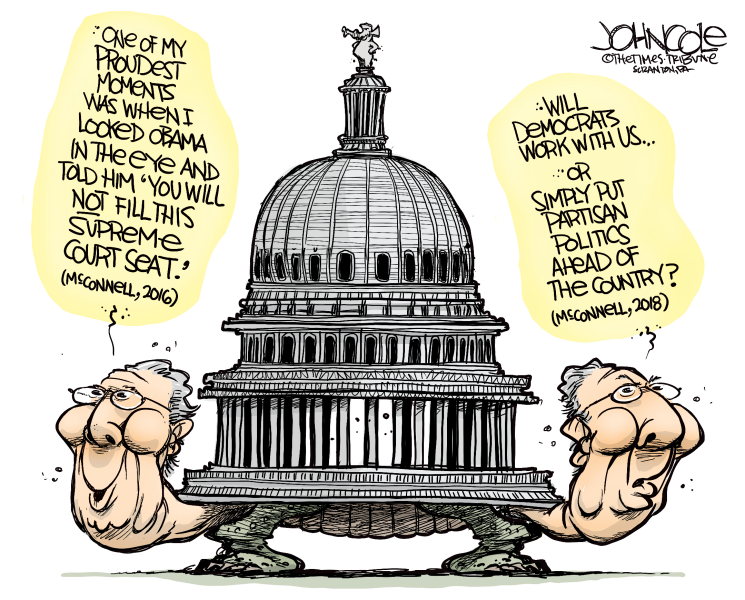Getting Things Done in a Divided Congress
by Matt Mackowiak
While one's reaction to this alteration of the power structure hinges upon his or her political preferences, there is one potential aspect of this change that most are begrudging: the prospect of watching yet another do-nothing Congress fueled by the childish obstinance of both sides.
Poll after poll indicates that the American people detest when legislative branch partisans engage in party-on-party warfare, where barking at the opposition on the House or Senate floor becomes a higher priority than passing bills. The voters' expectations for the functionality of their government are far from unreasonable; however, the legislative branch will never meet them if both sides of the aisle continue with their divisive political tactics that put party, rather than country, first.
It is critical for Democrats and Republicans to step away from the divisiveness and instead find areas of overlap in their agendas that could catalyze a fruitful working relationship in the new Congress. That means focusing on the three C's for political unity - criminal justice reform, civil liberties, and crony capitalism.
For years, everyone from hardcore conservatives such as Sen. Rand Paul (R-Ky.) to true-blue progressives like Sen. Cory Booker (D-N.J.) have expressed the importance of fixing the current criminal justice system that unfairly targets minorities and tears apart families, sending people to prison as a first response rather than a last resort.
President Trump's announcing his support for Congress' First Step Act on November 14, a reform deal that will make rehabilitation a priority, is a welcome step in the right direction. However, much more needs to be done. Mandatory minimum sentencing and other draconian punishments for nonviolent offenders require further addressing to ensure that all Americans still have the chance to succeed, prosper, and pursue the American Dream. Democrat and Republican congressional leaders would be foolish not to utilize this issue as an icebreaker for working together at the start of the next congressional session.
From protecting the freedom of the press to ensuring the free movement of thoughts and ideas online, there is plenty of agreement on free speech issues that both sides can and should work on come January.
Given both sides' opposition to companies' unauthorized use of American citizens' personal information from the Internet, now would also be the ideal time for the two parties to come together to safeguard privacy online.
Lastly, but perhaps most importantly, is the hatred for corporate welfare that most modern-day liberals and conservatives share.
Firebrand Rep.-elect Alexandria Ocasio-Cortez (D-N.Y.) and Fox News host Tucker Carlson recently agreed that the added $2 billion in subsidies Amazon CEO Jeff Bezos will receive to build its new headquarters is absurd when considering the state of the country's current infrastructure needs. However, most would agree that even more egregious than this gift to Bezos are the $5 billion in giveaways billionaire CEO Elon Musk has received over the years.
Take SpaceX, for example. While Musk touts the low cost of his reusable rockets, he recently imposed dramatic price increases on the government. Although concerning, these price hikes don't put a candle to Musk's seeming over-promising. Andy Pasztor at T, he Wall Street Journal suggests that the Falcon Heavy may now be incapable of achieving SpaceX's original objectives. Meanwhile, Musk's other rocket, the BFR, is currently only scheduled to conduct a private space tourism trip. It doesn't take a rocket scientist (no pun intended) to recognize that this is not a good use of government money.
Given the extent that both sides railed against crony capitalism on the campaign trail, in January members of both parties would be wise to put divisive talks about taxes and healthcare on the backburner and instead unite to ensure that government funding benefits the middle-class rather than millionaires and billionaires.
The American people have spoken, and while the two houses of Congress might not think favorably at the prospect of working together, governing is what they get paid to do. While being far from a comprehensive list, the three C's for political unity will provide a great starting point for both sides to begin humanizing one another and recognizing that partisan stalemates are far from necessary.
Hopefully, the soon-to-be members of the new Congress trade in their impassioned political dialogue for thoughtful conversations on these issues sooner rather than later.
-
Copyright 2018 Matt Mackowiak distributed exclusively by Cagle Cartoons newspaper syndicate.
Matt Mackowiak is president of Austin, Texas, and Washington, D.C.-based Potomac Strategy Group. He's a Republican consultant, a Bush administration and Bush-Cheney re-election campaign veteran and former press secretary to two U.S. senators.